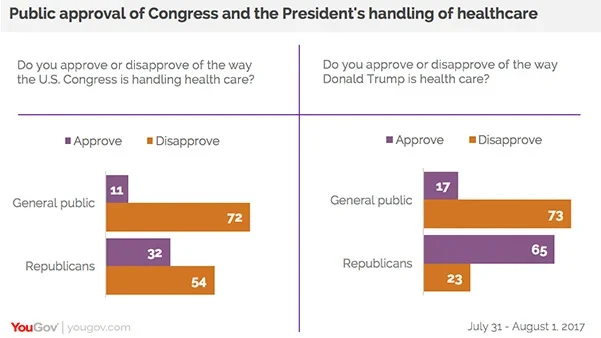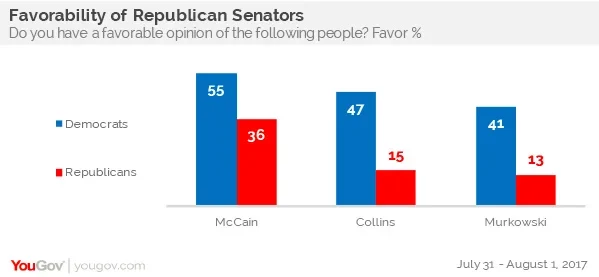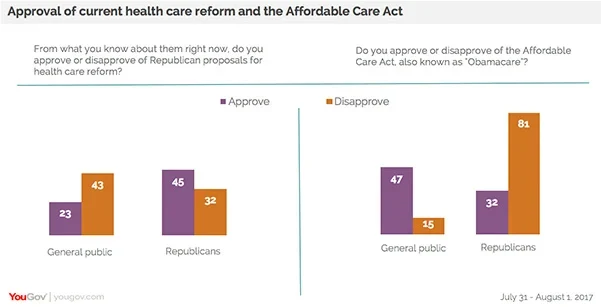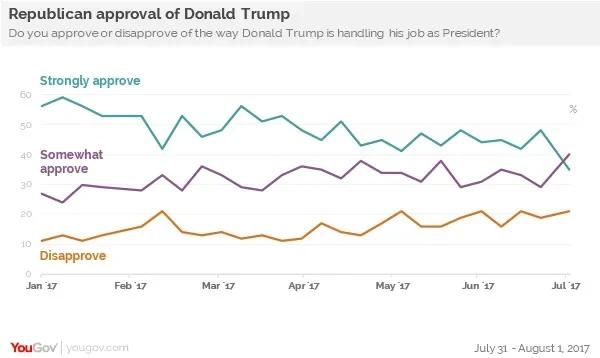1 in 3 Republicans disapprove of their own party's plans for health care reform
Congress’s failure to pass a repeal of the Affordable Care Act last week seems to have affected how many Americans, especially Republicans, view the President and Congress. Republicans see Congress in the most negative light they have all year. Far fewer say they strongly approve of the way President Trump is handling his job than ever before. And there is little expectation that Congress will take action on Obamacare anytime soon.
Congressional and Presidential marks on health care are low. In the latest Economist/YouGov Poll, just 11% of Americans approve of the way Congress is handling health care. More approve of the President on this issue, but his disapproval rating on the issue is the highest ever. And while Republicans give the President a positive evaluation on his handling of health care, just 17% of Republicans approve of how Congress has managed it.

At the start of the Trump Administration, Americans were divided evenly on how the President was handling health care. Now a majority disapprove.
There are some heroes and villains in Congress – and they are the same people, depending on the political party of the viewer. The three GOP senators who cast “no” votes on what became known as “skinny repeal” last week – John McCain of Arizona, Susan Collins of Maine and Lisa Murkowski of Alaska – are all liked by Democrats and disliked by Republicans. For McCain, who is the best known of the three, the gap is particularly striking. A majority of Democrats have a favorable view of him; a majority of Republicans do not.

Other Republicans in Congress don’t fare well with the public. 62%, the highest figure all year, have an unfavorable view of Republicans in Congress. Only 25%, the lowest percentage this year, are favorable. Only 50% of the public have unfavorable views of the Democrats in Congress, and more than a third are favorable towards Congressional Democrats.
When Democrats are asked about their party’s Congressional representatives, 78% are favorable; just 56% (lower than at any other time this year) of Republicans are favorable towards the Republicans in Congress. In the last week, Democrats with favorable opinions of their own party’s senators and representatives rose five points, while the percentage of Republicans with favorable assessments of their party’s members in Congress dropped by the same amount.
There is little support for what the GOP planned for health care. Twice as many disapprove as approve of the GOP health care proposals. More than a third of Republicans disapprove of their own party’s proposals. Opinion toward the Affordable Care Act itself is narrowly positive: 47% approve, 42% disapprove. More would either expand it or keep the law as it is that would repeal it.

Even Republicans are becoming more dubious that repeal and replace will ever happen. Four in ten now say that is unlikely. In early March, only 9% of Republicans thought that. For the first time since March, most Americans say repeal is unlikely.
Americans do support senators working in a bipartisan fashion on health care issues. Fewer than one in five say future health care legislative work should be done only by members of the Republican Party. Republicans agree that work should be bipartisan, but only by a narrow plurality.
Only 10% approve of the way Congress is doing its job overall, the lowest score since the beginning of the Trump Administration, while 62% disapprove. As for the President, his 37% overall approval rating this week matches the lowest previously recorded in Economist/YouGov Polls. Even more striking, however, is what has happened to his standing with Republicans. Three in four Republicans continue to approve of the President’s job performance. However, those who say they strongly approve dropped to 35% this week, down 13 points in a single week. 59% strongly approved at the start of the Administration.








